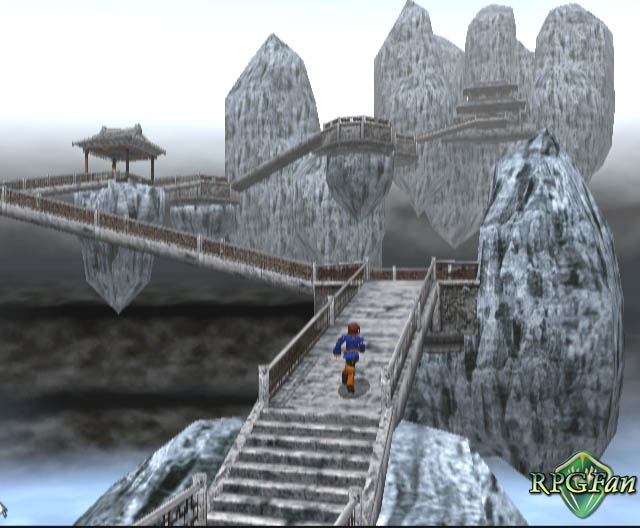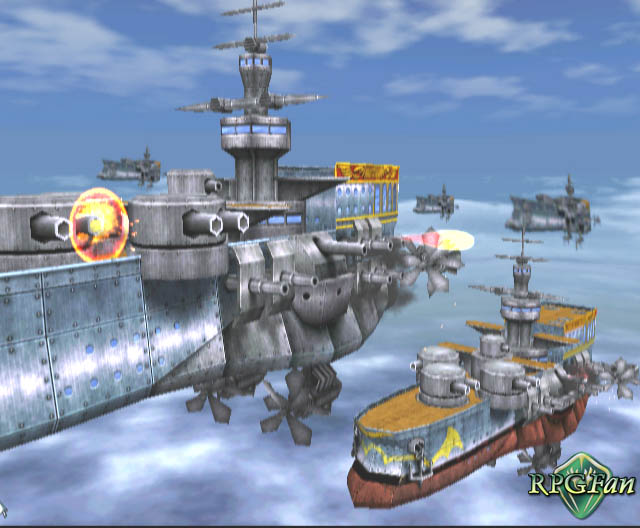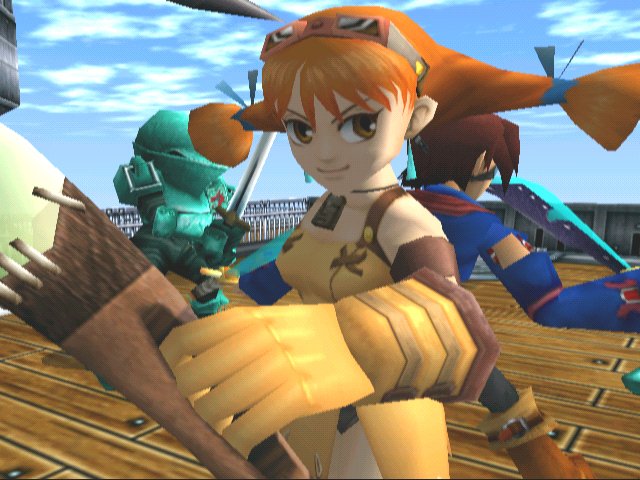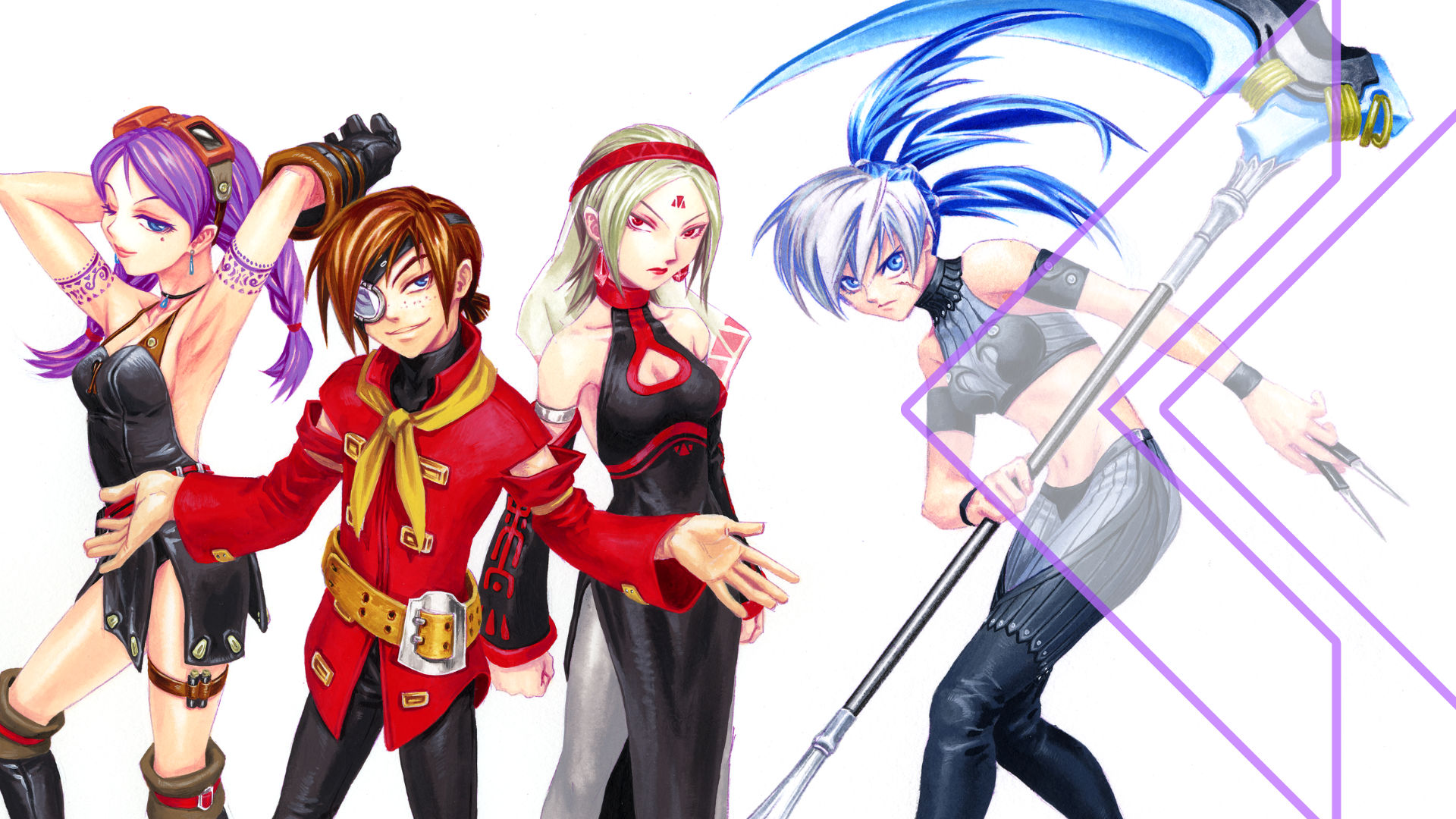Audra Bowling
Skies of Arcadia was a title I’d heard a lot about over the years, but like some of those pesky discoveries you search for throughout the game, it always eluded me. That changed with an incredibly kind gesture from our very own Michael Sollosi. While it took me far longer than I care to admit to sit down and play the game, I was finally able to experience what all the excited talk and fond nostalgia was all about. In a way, that was its own priceless discovery!
I can’t say that I found Skies of Arcadia to be a perfect game. It certainly has outdated dungeon designs, high random encounter rates, rough camera angles, and certain plot elements haven’t aged super well. Yet, when the game hits its stride, something truly wondrous happens. The battle system is fun and surprisingly robust; I had a blast experimenting with the color system and souping up my characters with over-the-top super moves once I collected enough moonberries. Ship battles offer a surprising layer of strategy, and their scale is nothing short of impressive. Recruiting crew members and decorating your very own pirate base reminded me of another RPG title that I cherish dearly, and I adored the title system tied to choices in-game. There’s just so much to see and do in Skies of Arcadia that the completionist in me couldn’t help but weep at having to leave some things unfinished, but it left me in awe all the same.
What really carries Skies of Arcadia is its sheer heart. The party members all grow on you as their interactions play out and their characters develop. Drachma’s journey is especially fulfilling, and I enjoyed Enrique’s subtle growth as he journeyed with Vyse and company (not to mention, the romance between Enrique and Moegi is just so cute!). Even though she was saddled with an unfortunate conclusion, Belleza was a fascinating antagonist. Clara was (as Aika puts it) just about the nicest stalker you could ever meet. Gilder stole just about every scene he was in, and I loved how Vyse’s crew all rallied together when push came to shove. The trio of Vyse, Aika, and Fina often had me smiling and cheering, and the sense of hopefulness and optimism that propelled the plot forward, even when things were bleak, was wonderful. Skies of Arcadia beautifully captures the delight of adventure, and I adored the message that the bonds we make are the true treasures we uncover. It was a ray of unexpected light that only gets brighter the further in the game you get, even amidst some truly dire plot developments.
From a story stance, I ended up enjoying Skies of Arcadia. Thanks to its colorful world, I still think it would make for one heck of an excellent anime adaptation! It hits some turbulence at times, but I could easily see those rough edges ironed out with some quality of life improvements if it ever receives the remaster or remake treatment. After seeing those heartfelt ending scenes, I sincerely hope it gets that treatment: this is an RPG tale that I think many would love to discover if it was more readily available these days.

Wes Iliff
I don’t know that Skies of Arcadia is my favorite RPG of all time, but it’s certainly in a class of its own. It does so many things well that other RPGs don’t even care to attempt, whether it’s the satisfaction of crewing and upgrading your own airship or exploring a world of clouds and floating islands. It has dashes of many other games, from Suikoden to Sega’s other classics like Phantasy Star and Panzer Dragoon Saga, but it pulls together into something wholly unique. It can sometimes feel like Skies of Arcadia is out of date; it has a ton of random encounters, some questionable sound (at least on the GameCube version), and some truly frustrating dungeon design. But it’s hard to actually say it’s outdated because there hasn’t been a game quite like it since.
It’s not just the gameplay that’s unlike other RPGs. The story vacillates between charming and dark in a way that never feels like tonal whiplash, and it’s hard not to feel joyous when sailing through the skies or meeting NPCs with more vitality and character than most other RPGs’ main casts. The world itself might be the most bombastic character, starting small but unfolding and opening throughout the story and showing a broad stroke of (occasionally problematic) cultures. Throw in fantastical discoveries and ship battle spectacles and the whole game just feels big.
I want everyone reading this to go play Skies of Arcadia. Even if you’ve played it before, it’s shocking how unique everything feels even all these years later. But it’s also a somewhat difficult recommendation because the rough edges have been made rougher still with time. This is a game begging for a remaster with some quality of life changes. It’s a game that is so close to clicking with a new audience if it only had the slightest push of consideration for modern fans. I hope Sega remembers its little RPG that could. But until it does, you owe it to yourself to experience Skies of Arcadia however you’re able.

Zach Wilkerson
The first time I gave Skies of Arcadia a shot, it didn’t click. Coming off of Grandia II and the rest of the dread-filled RPGs of the late 90s, the tone just… didn’t feel right? The protagonist was entirely too jovial, the music was cheery, and really, nothing bad seemed to happen to anyone. This was not the game I was hoping for in 2001.
It was my fault, of course. 21 years later, I can see what makes Skies of Arcadia so special.
That’s not to say the game is perfect, though. To be sure, the optimism infusing every element of the game is refreshing. Vyse, Aika, and Fina radiate positivity in a way that is enticing and often admirable. This is matched by the exquisite feeling of exploring the skies, discovering new landmarks, and just having a good time with your friends.
But sometimes I found the optimism, for lack of a better phrase, a little toxic. Sure, it’s great to go out and explore with your friends, but that also just seemed to be the end goal. I wouldn’t have a problem with this if Vyse and his group didn’t encounter real human suffering throughout their adventures. The fact that the game handles suffering pretty poorly doesn’t help, but I couldn’t help but be irked by Vyse’s constant need to ignore others’ unhappiness in favor of his own exploration and his frustrating misunderstandings of what other people need. This isn’t universally true throughout Skies of Arcadia, of course, but it happened enough times that it bothered me. The inclusion of moments like the one between Drachma and Rhaknam late in the game that showed real empathy and understanding are too infrequent, and the few moments of real humanity we have here made me more frustrated that the developers couldn’t do better throughout.
Nonetheless, I found myself falling under Skies of Arcadia‘s charm more often than not. Vyse and his crew are mostly kids, after all. And there’s so much to like about this game. Exploration, especially when the whole map opens up, is as delightful and satisfying as Vyse’s attitude suggests. Most of the dungeons are well designed and varied. I was particularly taken with the combat, which has just enough resource management to be engaging, and the optional battles littered throughout force you to fully engage in what the battle system has to offer. It even allowed me to build up a base and recruit characters, giving me just enough Suikoden to be satisfied.
At the end of the day, while I might not have been totally wrong about Vyse and Skies of Arcadia when I was 16, I certainly could have been a little more like him—heck, maybe I could now. Maybe I’m too grumpy to fully get behind what this game is doing. Regardless, I completely respect the ultimate goals of Skies of Arcadia, and I love most of the gameplay. If nothing else, that makes it worth playing in my book.

Alana Hagues
It turns out talking about your favourite video game ever can be hard.
I probably should have expected this. It was hard enough to write about just what makes Skies of Arcadia so special to me on its 20th anniversary. That piece crystallises something that I’ve been chasing after for years — the reason I keep going back to Skies of Arcadia time and time again. And sharing that experience with others is a little daunting. What if I’ve oversold this game? For a while, I thought I did. Skies of Arcadia might throw you right into the action and present its sparkly-eyed, romantic optimism through rose-coloured lenses, but the game doesn’t care much about nuance. There are sweeping stereotypes about cultures and poverty, and the game always teases a bigger world, yet it takes a while to deliver.
But when it does deliver, it’s like an upstream wind pushing the ship forward at a blistering speed. As the skies open up, you gather more discoveries, and you get your own airship, everything starts to pay off. The world of Arcadia is a character in its own right, with stories of history and culture that it wants to tell if you’re willing to search for those hidden landmarks or fight those giant sky monsters. Each corner of the world, basking under the light of a different moon, is a joy to uncover. Who can resist the Rabbats or the Icebird? And who else’s interest piques when you find an old shipwreck or a sky train? It’s a game that makes our imagination fly off the charts. Not even the awkward dungeons and high encounter rates can dampen my spirits as I discover an entire world, and watch the Blue Rogues rally behind Vyse and his crew all over again.
I dabbled around with an old save file and felt the thrill of just sailing around the skies, exploring the world again, for the first time in six years. I remembered how fun the combat was and how much I loved micromanaging the different stats and, but this time I was able to appreciate it more and use more magic. And I relished the challenge of the optional fights. I stuck to old habits, like picking my favourite crew members (who doesn’t have Pow as their jester? Come on now.), and using battle tactics I’d picked up on from my very first playthrough 20 years ago. But I also got to watch my partner play through half the game for the first time, and I learned a lot from seeing him play it and got to look at the game from a different perspective. That alone made revisiting this special.
So, yes, revisiting Skies of Arcadia for the first time in six years was daunting. I rambled through two podcast episodes, doubting myself, making mistakes, and overworrying. But it was so joyful to re-experience the game once again and share that experience with some newcomers. No other video game will make me feel the same way as this Sega classic does, and because of that, I’ll cherish it forever. But I won’t ever stop begging for a remaster. I can’t think of another game more deserving of one, with a few quality of life features of course.

